
BULLETIN OF THE BRAZILIAN MATHEMATICAL SOCIETY
Scope & Guideline
Fostering Collaboration and Growth in Mathematical Research
Introduction
Aims and Scopes
- Algebra and Number Theory:
Research in algebra, including topics such as algebraic structures, group theory, and number theory, focusing on both classical and modern approaches. - Analysis and Functional Analysis:
Papers exploring real and complex analysis, functional analysis, and their applications, particularly in understanding differential equations and operator theory. - Geometry and Topology:
Contributions addressing geometric structures, topology, and their interrelations, including manifold theory, algebraic topology, and differential geometry. - Dynamical Systems and Ergodic Theory:
Studies involving dynamical systems, including chaos theory, stability, and ergodic properties, providing insights into the behavior of complex systems. - Applied Mathematics and Mathematical Physics:
Research that applies mathematical theories to solve problems in physics and engineering, emphasizing models, simulations, and computational methods. - Mathematical Logic and Foundations:
Exploration of the foundations of mathematics, including set theory, model theory, and the philosophy of mathematics, contributing to the understanding of logical structures.
Trending and Emerging
- Nonlinear Differential Equations:
An increasing number of papers focus on the existence, uniqueness, and stability of solutions to various classes of nonlinear differential equations, reflecting a growing interest in their applications across different fields. - Mathematical Modeling and Analysis:
There is a notable trend towards mathematical modeling, particularly in applied contexts such as fluid dynamics and dynamical systems, showcasing the relevance of mathematics in real-world problems. - Topology and Algebraic Structures:
Emerging themes in topology, especially in relation to algebraic structures, are becoming more prominent, indicating a resurgence of interest in the foundational aspects of mathematics. - Quantum Mathematics and Applications:
Research related to quantum theories and their mathematical underpinnings is on the rise, suggesting an interdisciplinary approach that connects mathematics with physics and engineering. - Computational Mathematics:
The integration of computational techniques in mathematical research is increasing, reflecting the importance of numerical methods and simulations in solving complex mathematical problems.
Declining or Waning
- Classical Geometry:
Research in classical geometry, including Euclidean and projective geometry, appears to be less frequently addressed compared to more modern geometric theories and applications. - Elementary Number Theory:
Papers specifically dedicated to elementary approaches in number theory are declining as more complex and abstract methodologies gain traction in the field. - Combinatorial Mathematics:
While combinatorial topics are still present, the frequency of publications directly focused on combinatorial problems has decreased, potentially as researchers pursue more integrated mathematical frameworks.
Similar Journals
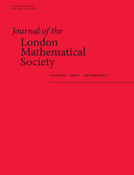
JOURNAL OF THE LONDON MATHEMATICAL SOCIETY-SECOND SERIES
Connecting Scholars Through Groundbreaking Mathematical ResearchJOURNAL OF THE LONDON MATHEMATICAL SOCIETY-SECOND SERIES, published by Wiley, stands as a premier publication in the field of mathematics, particularly recognized for its contributions to general mathematics and its ability to shape contemporary mathematical discourse. With an impact factor that reflects its high citation rate and academic influence, this journal has secured a prestigious Q1 ranking in the Mathematics (miscellaneous) category as of 2023. Encompassing a rich history from its inception in 1926 through various publication phases until 2024, it continues to attract and disseminate innovative research, serving as a vital resource for scholars, practitioners, and students alike. Although it does not currently offer open access options, the journal's commitment to advancing mathematical knowledge makes it an essential source for the latest developments in the discipline. For those engaged in mathematical research, insights from the JOURNAL OF THE LONDON MATHEMATICAL SOCIETY-SECOND SERIES are invaluable in fostering a deeper understanding and sparking new ideas within the mathematical community.
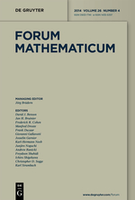
FORUM MATHEMATICUM
Pioneering Research in Applied and Theoretical MathematicsFORUM MATHEMATICUM, published by WALTER DE GRUYTER GMBH, is a distinguished academic journal based in Germany, known for its significant contributions to the field of mathematics. With an ISSN of 0933-7741 and an E-ISSN of 1435-5337, the journal features comprehensive studies ranging from applied mathematics to diverse mathematical disciplines. Having maintained a commendable presence since 1989, FORUM MATHEMATICUM has achieved notable classification rankings, including Q2 in Applied Mathematics and Q1 in miscellaneous Mathematics as of 2023. Additionally, it holds a Scopus rank within the top 60th percentile in General Mathematics, making it a prominent platform for researchers and professionals seeking rigorous analysis and innovative methodologies in mathematics. While the journal does not currently offer open access, its rich content is pivotal for advancing mathematical theory and applications, appealing to students and seasoned academics alike.

TRANSACTIONS OF THE AMERICAN MATHEMATICAL SOCIETY
Advancing Mathematical Frontiers Since 1900TRANSACTIONS OF THE AMERICAN MATHEMATICAL SOCIETY, published by the American Mathematical Society, is a premier journal in the field of mathematics that has been contributing to the advancement of mathematical knowledge since 1900. With an ISSN of 0002-9947 and an E-ISSN of 1088-6850, this journal holds a prestigious position in the academic landscape, evidenced by its Q1 rankings in both Applied Mathematics and Miscellaneous Mathematics categories as of 2023. With a Scopus ranking of #97 in General Mathematics and a percentile standing of 75th, the journal is recognized for its rigorous peer-review process and the quality of the research it publishes. Though it does not currently offer open access options, it essentially serves as a vital resource for researchers, professionals, and students seeking critical insights and developments in mathematical theory and applications. The Transactions aim to publish high-quality research articles that foster the exchange and dissemination of ideas, supporting the growth of both theoretical and applied mathematics within the global scholarly community.

JOURNAL OF THE EUROPEAN MATHEMATICAL SOCIETY
Empowering Global Mathematical ResearchThe JOURNAL OF THE EUROPEAN MATHEMATICAL SOCIETY, published by the EUROPEAN MATHEMATICAL SOCIETY (EMS), stands as a premier platform in the field of mathematics, known for its rigorous editorial standards and impactful contributions to both applied and theoretical aspects of the discipline. With a commendable Q1 ranking in both Applied Mathematics and Miscellaneous Mathematics categories, alongside a Scopus rank of 32 out of 399 in General Mathematics, this journal has established itself as a crucial resource for researchers and professionals. Since achieving Open Access status in 2021, it has expanded its reach, making cutting-edge research more accessible to a global audience. With a publication horizon extending from 2002 to 2024 and a dedicated focus on high-quality mathematical scholarship, the journal continues to foster innovation and collaboration within the mathematical community.

Bulletin Mathematique de la Societe des Sciences Mathematiques de Roumanie
Empowering Researchers with Rigorous Mathematical InsightsThe Bulletin Mathematique de la Societe des Sciences Mathematiques de Roumanie, published by SOC MATEMATICE ROMANIA, is a distinguished platform dedicated to the dissemination of advanced mathematical research and developments. With ISSN 1220-3874 and E-ISSN 2065-0264, this journal serves the global mathematical community, particularly in Romania, fostering collaboration and innovation in varied mathematical disciplines. Despite being categorized in the Q3 quartile of the *Mathematics (miscellaneous)* field and holding a Scopus rank placing it in the 19th percentile, the journal remains committed to publishing high-quality articles that explore theoretical and applied mathematics. Running from 2008 to 2024, it aims to encourage the sharing of knowledge and advancements within both academic and practical domains, affirming its importance as a valuable resource for researchers, professionals, and students alike. Although the journal does not currently offer open access, it contributes to the mathematical discourse through the rigorous selection of papers that adhere to high scholarly standards.
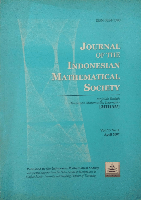
Journal of the Indonesian Mathematical Society
Elevating Mathematical Discourse for a Global Audience.Journal of the Indonesian Mathematical Society is an esteemed platform that serves as a vital conduit for the dissemination of research in various domains of mathematics. Published by the Indonesian Mathematical Society, this journal prioritizes fostering mathematical knowledge and innovation among scholars both regionally and globally. While it currently holds a Q4 ranking in the field of Mathematics (miscellaneous) and ranks within the lower percentile on Scopus, it actively encourages contributions from mathematicians that push the boundaries of current research trends. The journal, accessible at imsi.org/journal, emphasizes open access to ensure that findings reach a wider audience, thereby enhancing their impact. Located in Bandung, Indonesia, and set to converge its publication years from 2019 to 2024, it stands as an important venue for researchers, professionals, and students engaged in mathematical inquiry and advancement.
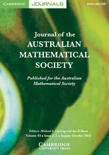
JOURNAL OF THE AUSTRALIAN MATHEMATICAL SOCIETY
Empowering mathematicians with innovative research insights.JOURNAL OF THE AUSTRALIAN MATHEMATICAL SOCIETY, published by Cambridge University Press, is a prestigious journal dedicated to advancing research and scholarship in the field of mathematics. With a long-standing history since its inception in 1959, the journal has established itself as a vital resource for mathematicians, researchers, and students worldwide. Operating under an Open Access model, it ensures that high-quality research is accessible to all, enhancing the dissemination of knowledge and fostering collaboration in the mathematical community. The journal holds a commendable Q2 ranking in the 2023 Mathematics (miscellaneous) category and is ranked #145 in Scopus among general mathematics journals, placing it in the 63rd percentile, which reflects its significant influence and reputation in the discipline. The JOURNAL OF THE AUSTRALIAN MATHEMATICAL SOCIETY continues to provide a platform for innovative mathematical research and critical discourse within the field, making it an invaluable asset for professionals and aspiring mathematicians alike.

European Journal of Mathematics
Pioneering Research in the Heart of EuropeWelcome to the European Journal of Mathematics, a prominent publication that serves as a vital platform for disseminating high-quality research in the field of mathematics. Published by Springer International Publishing AG, this journal has witnessed significant growth since its inception in 2015 and is recognized for its contributions within the Q2 category of Mathematics (miscellaneous) as per the 2023 rankings. With an ISSN of 2199-675X and an E-ISSN of 2199-6768, the journal aims to foster innovation and collaboration among researchers, professionals, and students alike. Although it operates under a traditional access model, the journal's commitment to advancing mathematical knowledge and applications cannot be overstated. Positioned among the top-tier publications, the European Journal of Mathematics is an essential resource that encourages the exploration of emerging trends and theories in mathematics, making it indispensable for anyone striving to stay at the forefront of this dynamic field.

Pure and Applied Mathematics Quarterly
Connecting Mathematicians Through Quality ResearchPure and Applied Mathematics Quarterly is a prestigious journal published by INT PRESS BOSTON, INC, focusing on the diverse and evolving field of mathematics. Since its inception in 2007, this journal has grown significantly, currently holding a Q1 ranking in the Mathematics (Miscellaneous) category for 2023, positioning it among the leading publications in the discipline. With a commitment to publishing high-quality research, Pure and Applied Mathematics Quarterly fosters innovation and dialogue within the mathematical community by providing a platform for theoretical advancements and practical applications. The journal remains accessible to researchers and professionals through its ISSN 1558-8599 and E-ISSN 1558-8602, although it does not currently offer open access. As a vital resource for mathematicians, educators, and students, this journal endeavors to expand the frontiers of mathematical knowledge and contribute to the academic dialogue surrounding this fundamental science.
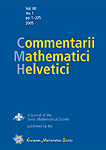
COMMENTARII MATHEMATICI HELVETICI
Unveiling the Depths of Mathematical DiscoveryCOMMENTARII MATHEMATICI HELVETICI, published by the EUROPEAN MATHEMATICAL SOCIETY, is a premier open-access journal in the field of mathematics, specifically categorized within the Q1 quartile of miscellaneous mathematics as of 2023. With an ISSN of 0010-2571 and an E-ISSN of 1420-8946, this esteemed journal has a rich history, having commenced its publication journey in 1929 and set to continue until at least 2024. Based in Germany, it provides a valuable platform for original research and significant advancement in mathematical theory and application, appealing to researchers, professionals, and students alike. The journal's commitment to open access since 2022 further enhances its accessibility and outreach, ensuring that cutting-edge mathematical developments are readily available to a global audience. Its Scopus ranking, which places it at the 165th position out of 399 in the general mathematics category (58th percentile), exemplifies its impact and relevance in the academic community.